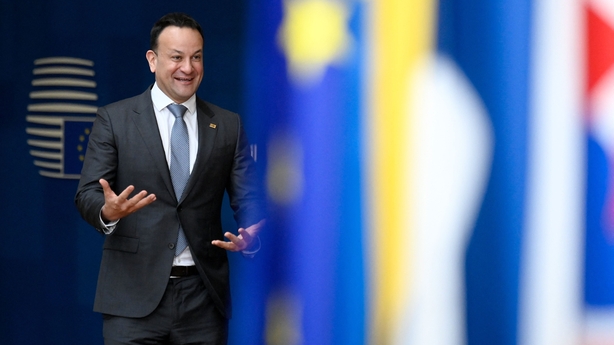Taoiseach Leo Varadkar has said he is disappointed that the DUP has chosen not to return to Stormont following yesterday’s House of Commons vote on the Windsor Framework and the so-called Stormont Brake.
He told reporters in Brussels: “I’m disappointed to hear that the DUP isn’t willing to go back into the executive and assembly. I think they should.
“People in Northern Ireland are facing big problems, inflation, a housing crisis, a health service that’s under enormous pressure, all the problems that we face, and worse.
“What they need is their politicians in Stormont in government, sorting out those problems for them.”
Mr Varadkar is in Brussels today for a meeting of European Union leaders where the Windsor Framework will be discussed.
The summit is also expected to consider economic issues, energy and migration, and the leaders will meet United Nations Secretary General Antonio Guterres.
The meeting comes after EU member states approved the framework on Tuesday, and a key element of it – the Stormont brake – was endorsed by the House of Commons in London yesterday.
He said it was premature to talk about direct rule by Westminster if Stormont is not restored, but that it was “the consistent position of the Irish Government that direct rule is not provided for in the Good Friday Agreement, and we couldn’t support going back to that.”
The Taoiseach welcomed yesterday’s vote on the Stormont Brake as very positive.
“I’m confident that the UK government and the European Union will implement the Windsor framework now in good faith. And that’s going to be to the benefit of people in Northern Ireland in particular.”
The Democratic Unionist Party voted against the brake, with leader Jeffrey Donaldson saying it wanted assurances that EU law could not impede Northern Ireland’s ability to trade with the rest of the UK.
Speaking ahead of the European Council meeting, the Taoiseach said the latest developments on the Windsor Framework and the “difficult situation” in Ukraine would be discussed.

consider economic issues, energy and migration
“I am joining other EU leaders in Brussels to reaffirm our solidarity and continued political, economic, military, financial and humanitarian support to Ukraine.
“As we have said before, we will stand with Ukraine for as long as it takes.
“We will discuss recent developments regarding the Windsor Framework and there will be an important discussion on economic issues, including how to ensure Europe’s future prosperity.
“I will be encouraging further work to improve the competitiveness of the European economy, making the most out of our single market, to drive future growth.
“We need to accelerate the green transition, boost skills, strengthen the single market and maintain an open and ambitious trade policy.”
European Commission Vice-President Maroš Šefčovič is due to travel to London tomorrow, where he is to meet with Foreign Secretary James Cleverly and Northern Ireland Secretary Chris Heaton-Harris as part of the EU-UK Joint Committee.
This was a body set up as part of the Brexit process to oversee the implementation of the protocol and facilitate any changes as may have been required.
The topics officially on the summit agenda are support for Ukraine, notably the coordinated procurement of ammunition, as well as EU competitiveness and proposals for a revamp of energy market rules, the official said.
The EU should show it stood for free and fair trade by continuing to conclude free trade agreements with other regions such as South America’s Mercosur and countries like Kenya, Australia, India and Indonesia, they said.
“We are in competition with China here, so it is in our interest to remain ahead and push for a rules-based, fair approach,” the official added.
A discussion with Mr Guterres will also focus on the impact of the Ukraine crisis on the global south, most notably on food security.
EU ban on fossil fuels cars not on summit agenda – German official
The EU’s planned ban on new combustion engines from 2035 is not on the agenda of the summit but talks between the European Commission and Germany about their differences over the issue are “very constructive”, a German government official said.
“We are confident that we will soon come to a solution,” the official said added. “The discussions are very, very constructive.”
After months of negotiations, the European Parliament, the European Commission and member states agreed last year that new cars sold in the EU from 2035 to have zero CO2 emissions – effectively making it impossible to sell combustion engine cars from that date.
But Germany this month declared its last-minute opposition in an unusual move that sparked indignation among some EU diplomats.
It wants sales of new cars with internal combustion engines to be allowed after that date if they run on e-fuels.
The official reiterated Germany’s position that this was part of the EU’s original agreement – “that is sometimes forgotten”.
“There is nothing negative about the fact we are insisting on this,” the official said. “This is completely normal European procedure”.
Additional reporting Reuters/PA
Taoiseach ‘disappointed’ with DUP’s Windsor rejection
Source: Viral Trends Report


0 Comments